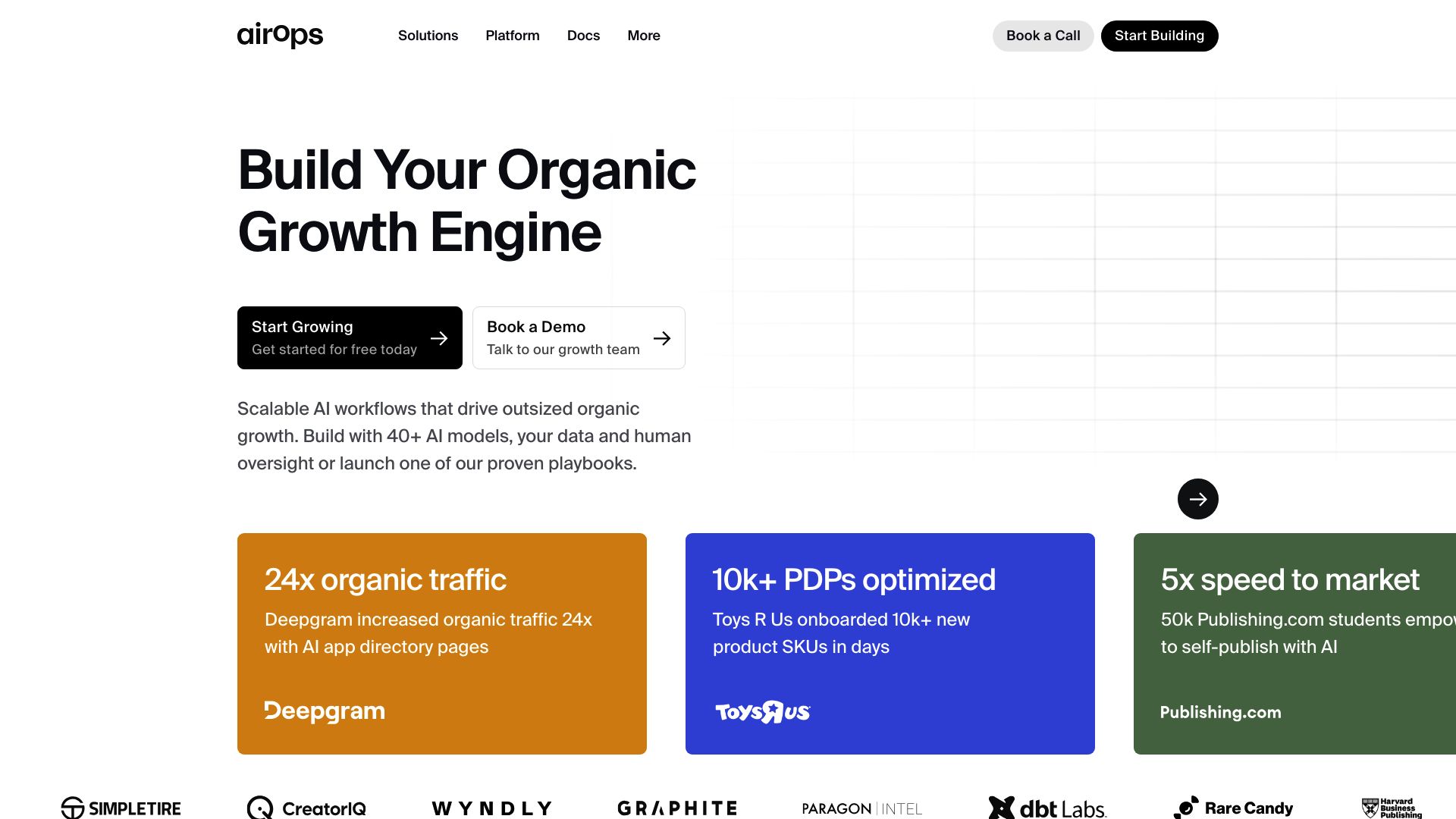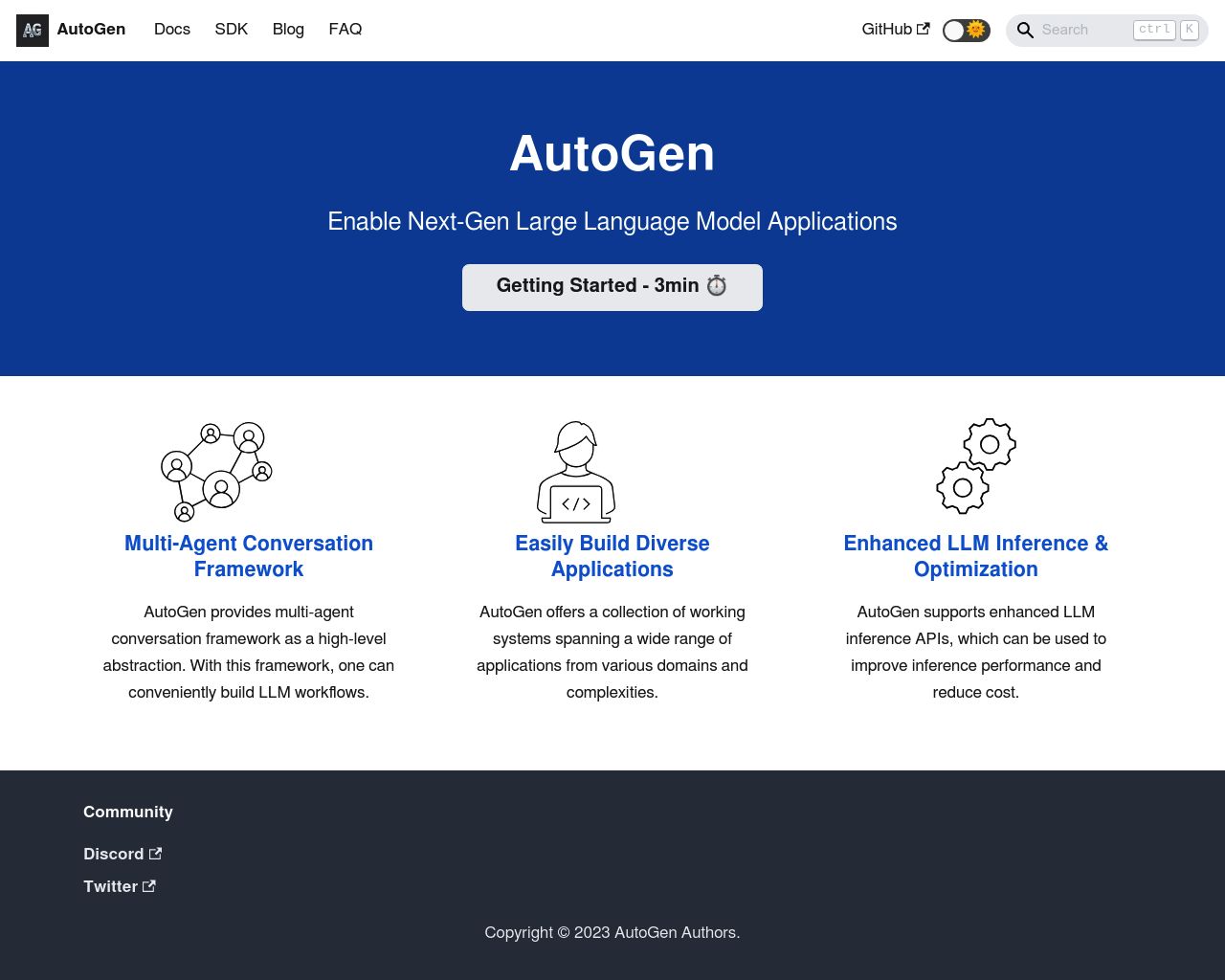AirOps vs. AutoGen: Key Feature Comparison
The AI landscape is evolving, offering powerful tools to streamline workflows and enhance productivity across industries. This comparison dives into two notable platforms: AirOps vs. AutoGen. AirOps is a commercial solution designed for scalable AI workflows while AutoGen is an open-source framework for developing Large Language Model applications.
We’ll explore their key features, strengths, and limitations to help you make an informed decision about which tool best suits your needs. Whether you’re a developer seeking customization options, a business leader looking for enterprise-ready solutions, or a non-technical professional aiming to harness AI’s potential, this review will provide valuable insights into how these platforms stack up against each other and our own SmythOS solution.
AirOps Overview
AirOps is a commercial platform designed to empower businesses with scalable AI workflows. The platform caters to a wide range of users, from developers and data scientists to business leaders and non-technical professionals, offering tools to create and implement AI-driven solutions that can significantly boost organic growth and operational efficiency.


AirOps stands out with its ability to integrate over 40 AI models, allowing users to build custom workflows that leverage their own data and incorporate human oversight. The platform’s key strength lies in its proven playbooks, which are pre-designed workflows tailored for specific business functions such as SEO optimization, product listing management, and content creation.
One of the platform’s flagship products is the AirOps AI Data Sidekick, a tool that assists data practitioners in writing, optimizing, and troubleshooting SQL queries and building Python models. This tool exemplifies AirOps’ commitment to enhancing productivity across various data-related tasks.
AirOps offers a visual workflow builder that simplifies the creation of complex AI-driven processes without requiring extensive coding knowledge. This feature, combined with the platform’s no-code and low-code editors, makes it accessible to users with varying levels of technical expertise. The platform also supports multimodal inputs and outputs, allowing agents to handle text, audio, and video data, which broadens its applicability across different use cases.
While AirOps provides a robust set of features, users should consider their specific needs when evaluating the platform. The learning curve associated with leveraging the full potential of the platform’s capabilities might be steep for some users, particularly those new to AI workflow design. Additionally, as with any AI platform, the quality of outputs will largely depend on the quality of inputs and the thoughtful design of workflows.
The learning curve associated with leveraging the full potential of the platform’s capabilities might be steep for some users, particularly those new to AI workflow design.
AutoGen Overview
AutoGen is an open-source framework designed for developing Large Language Model (LLM) applications using multi-agent conversations. It offers a sophisticated platform for creating customizable and conversable agents that can interact with each other, LLMs, tools, and humans to solve various tasks.


AutoGen’s core feature is its ability to facilitate multi-agent conversations. These agents can collectively perform tasks autonomously or with human feedback, making the framework highly adaptable for different use cases. It maximizes the performance of LLMs like ChatGPT and GPT-4 by offering enhanced inference capabilities, including functionalities such as tuning, caching, error handling, and templating.
The framework supports both fully autonomous agent operations and human-in-the-loop problem-solving. This flexibility is significant for applications where human input is essential. AutoGen has demonstrated effectiveness in a wide range of applications, from automated task solving and code generation to continual learning and complex problem-solving in group chats.
For developers, AutoGen provides useful debugging tools, including logging functionalities for API calls, which is essential for diagnosing and optimizing LLM-based systems. It also includes EcoOptiGen, a cost-effective technique for tuning large language models, highlighting its focus on enhancing the efficiency and effectiveness of LLMs.
While AutoGen offers powerful capabilities, it may present challenges for users without extensive programming knowledge. The framework’s open-source nature means that users are responsible for hosting and maintaining their own infrastructure, which could be a drawback for those seeking a fully managed solution. Additionally, the level of customization and flexibility offered may require a steeper learning curve compared to more user-friendly, no-code platforms.
The framework’s open-source nature means that users are responsible for hosting and maintaining their own infrastructure, which could be a drawback for those seeking a fully managed solution.
Feature Comparison
AirOps and AutoGen offer distinct approaches to AI agent development, each with its own strengths and limitations. AirOps provides a user-friendly platform with pre-built playbooks and integrations, making it accessible to users with varying levels of technical expertise. Its visual workflow builder allows for the creation of complex AI-driven processes without extensive coding knowledge. AutoGen, on the other hand, is an open-source framework that offers more flexibility and customization options for developers who are comfortable with programming.
AirOps provides a user-friendly platform with pre-built playbooks and integrations, making it accessible to users with varying levels of technical expertise.
One notable difference is in their deployment options. AirOps offers a fully managed solution, allowing users to easily deploy agents across various environments. AutoGen, being open-source, requires users to manage their own infrastructure, which may present challenges for those seeking a turnkey solution. In terms of security features, AirOps provides robust data encryption and OAuth support, while AutoGen’s security measures are more dependent on the user’s implementation.
While both platforms support multi-agent collaboration, AirOps’ pre-built templates and integrations may offer a more streamlined experience for business users. AutoGen’s strength lies in its extensibility and the ability to create highly customized agent behaviors. However, this flexibility comes with a steeper learning curve. Our SmythOS platform combines the best of both worlds, offering an intuitive interface like AirOps with the customization capabilities of AutoGen, all while providing superior scalability and integration options.
| AirOps | AutoGen | SmythOS | |
|---|---|---|---|
| CORE FEATURES | |||
| Hosted Agents (Dev, Production) | ✅ | ❌ | ✅ |
| Environments (Dev, Production) | ✅ | ❌ | ✅ |
| Visual Builder | ✅ | ❌ | ✅ |
| No-Code Options | ✅ | ❌ | ✅ |
| Explainability & Transparency | ❌ | ❌ | ✅ |
| Work as Team | ✅ | ❌ | ✅ |
| SECURITY | |||
| Constrained Alignment | ❌ | ❌ | ✅ |
| Data Encryption | ✅ | ❌ | ✅ |
| OAuth | ✅ | ❌ | ✅ |
| IP Control | ✅ | ❌ | ✅ |
| COMPONENTS | |||
| Huggingface AIs | ✅ | ❌ | ✅ |
| Zapier APIs | ✅ | ❌ | ✅ |
| All other APIs, RPA | ✅ | ❌ | ✅ |
| Classifiers | ✅ | ❌ | ✅ |
| Data Lakes | ✅ | ❌ | ✅ |
| DEPLOYMENT OPTIONS (EMBODIMENTS) | |||
| Deploy as API | ✅ | ❌ | ✅ |
| Deploy as Webhook | ✅ | ❌ | ✅ |
| Staging Domains | ✅ | ❌ | ✅ |
| Production Domains | ✅ | ❌ | ✅ |
| API Authentication (OAuth + Key) | ✅ | ❌ | ✅ |
| Deploy as Site Chat | ✅ | ❌ | ✅ |
| Deploy as Scheduled Agent | ✅ | ❌ | ✅ |
| Deploy as GPT | ✅ | ❌ | ✅ |
| Scalability | ✅ | ❌ | ✅ |
| DATA LAKE SUPPORT | |||
| Hosted Vector Database | ✅ | ❌ | ✅ |
| Sitemap Crawler | ✅ | ❌ | ✅ |
| YouTube Transcript Crawler | ✅ | ❌ | ✅ |
| URL Crawler | ✅ | ❌ | ✅ |
| PDF Support | ✅ | ❌ | ✅ |
| Word File Support | ✅ | ❌ | ✅ |
| TXT File Support | ✅ | ❌ | ✅ |
Best Alternative to AirOps and AutoGen
SmythOS emerges as the superior alternative to AirOps and AutoGen, offering a comprehensive and user-friendly platform for AI agent development. We combine the intuitive interface of AirOps with the customization capabilities of AutoGen, while providing unmatched scalability and integration options. Our visual builder allows users to create complex AI workflows without extensive coding knowledge, making it accessible to both technical and non-technical users. Unlike AutoGen, which requires users to manage their own infrastructure, SmythOS offers a fully managed solution with seamless deployment across various environments. We provide robust security features, including data encryption and OAuth support, ensuring your AI agents operate in a secure environment.
Our platform excels in multi-agent collaboration, offering pre-built templates and integrations that streamline the process for business users while maintaining the flexibility for advanced customization. With SmythOS, you can easily deploy AI agents as APIs, webhooks, site chats, or scheduled tasks, providing unparalleled versatility in how you utilize AI in your workflows. Our extensive integration ecosystem, including support for various AI models, APIs, and data sources, allows SmythOS to adapt to virtually any business process or industry-specific need. By choosing SmythOS, you’re not just selecting a tool, but embracing a future-proof platform that continuously evolves to meet the changing demands of AI technology and business requirements.
Conclusion
AirOps and AutoGen offer distinct approaches to AI agent development, each with its own strengths. AirOps provides a user-friendly platform with pre-built playbooks and integrations, making it accessible to users with varying technical expertise. AutoGen, as an open-source framework, offers more flexibility and customization options for developers comfortable with programming.
While both platforms have their merits, SmythOS emerges as the superior alternative, combining the best features of both while offering unparalleled versatility and ease of use. We provide a comprehensive platform that caters to a wide range of users, from developers to business leaders and non-technical professionals. Our visual builder allows for the creation of complex AI workflows without extensive coding knowledge, making AI development accessible to all.
SmythOS stands out with its extensive integration ecosystem, supporting various AI models, APIs, and data sources. This flexibility allows our platform to adapt to virtually any business process or industry-specific need. Unlike AutoGen, which requires users to manage their own infrastructure, we offer a fully managed solution with seamless deployment across various environments. Our robust security features, including data encryption and OAuth support, ensure your AI agents operate in a secure environment.
For those interested in experiencing the power and versatility of SmythOS, we invite you to create a free account and start building your AI agents today. Discover how SmythOS can revolutionize your workflow and drive innovation in your organization. Explore our extensive library of agent templates to jumpstart your AI journey and learn more about deploying your agents anywhere. Join us in shaping the future of AI-driven business solutions with SmythOS.
Last updated:
Disclaimer: The information presented in this article is for general informational purposes only and is provided as is. While we strive to keep the content up-to-date and accurate, we make no representations or warranties of any kind, express or implied, about the completeness, accuracy, reliability, suitability, or availability of the information contained in this article.
Any reliance you place on such information is strictly at your own risk. We reserve the right to make additions, deletions, or modifications to the contents of this article at any time without prior notice.
In no event will we be liable for any loss or damage including without limitation, indirect or consequential loss or damage, or any loss or damage whatsoever arising from loss of data, profits, or any other loss not specified herein arising out of, or in connection with, the use of this article.
Despite our best efforts, this article may contain oversights, errors, or omissions. If you notice any inaccuracies or have concerns about the content, please report them through our content feedback form. Your input helps us maintain the quality and reliability of our information.
